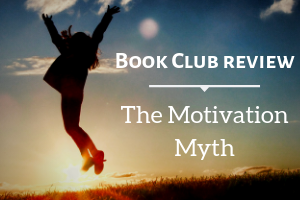 It seems like we’re always waiting. We wait for inspiration to move us, opportunities to come to us, and even the train ride home that is consistently late. When we want to make a change in our lives, we find ourselves repeating these familiar patterns. But what if you broke the habit?
It seems like we’re always waiting. We wait for inspiration to move us, opportunities to come to us, and even the train ride home that is consistently late. When we want to make a change in our lives, we find ourselves repeating these familiar patterns. But what if you broke the habit?
In The Motivation Myth: How High Achievers Really Set Themselves Up to Win, Jeff Haden shows us how to be proactive goal-setters, sharing what we can do today to reach our long-term goals of tomorrow. We recently read this book for the Dimensional Insight Book Club. Here are our thoughts.
Meet our panel
Our book club panel for The Motivation Myth consists of members of the Dimensional Insight marketing team: Kathy Sucich, senior content and communications manager; Rose Weinberger, senior marketing manager; Alison Nicoli, marketing communications manager; Irina Nebosenko, web graphic designer; and myself.
What was your biggest takeaway from The Motivation Myth?
Alison: I loved the concept of there not being a “perfect time” to start being successful because you just have to do it without being motivated. It is so easy to waste time complaining about where you are at in life, instead of jumping head first into fixing it.
Kathy: My biggest takeaway was that if you’re faced with a big task, instead of obsessing over how to get to the end product, just take a step towards achieving it. Often times, that small step leads to the next small step, which leads to the next. And next thing you know, you’ve made significant progress.
Rose: The biggest thing I took away from reading “The Motivation Myth” was to be reminded of the basic premise of cognitive therapy – emotions are caused by thoughts and therefore it is important to think properly. Of course, there’s a big leap from generic emotions to specifically feeling motivated. And that is why using the book as a reminder is most important – if we sit around waiting to “feel” motivated, we may end up waiting a long time! It is only by having the right thinking and what’s more doing something that the feeling of motivation can be triggered. The author’s premise is that small successes motivate us to continue. So, break big tasks into sets of smaller tasks. Suck it up to get started. Then, with minor successes under your belt, you’ll be motivated to tackle the rest of the smaller tasks.
Kayla: The importance of creating a plan (and following it). I have the tendency to think big-picture, so it was a good reminder for me to break down my larger goals into smaller ones and work on them from there. I also liked how Haden’s tone emphasized self-responsibility and that we can all make success for ourselves (in whichever way that you define it).
Irina: My biggest takeaway from the book is the idea that one doesn’t have to wait for magical or inspirational moment to make a change in their life, and that confidence is a fluctuating entity. Haden goes into detail about this when he shares the story of his friend who doesn’t feel confident unless he wins marathons. It makes you question the reason for why people do the things that they do and how their successes (and failures) contribute towards their personal development/character.
Haden believes that “small successes are fun and motivating,” and that the satisfaction that follows accomplishing a small task can lead you towards accomplishing larger goals. What small successes motivate you?
Kayla: For me, it doesn’t matter what the task is. It could be a menial task or one of much more impact. If it was something that I was responsible for and I completed it, then I consider that to be an automatic win.
Irina: Any moment of success that is part of a larger goal that I have been working towards. It proves to me that I am on the right track.
Alison: As I read this question, my mind immediately went to what I thought others would consider small successes. For example, going to the gym and getting back in shape consistently for over a year, or accepting my first internship here at Dimensional Insight. After a while I started to think to myself, no, those are not small successes. To me, those were huge successes. Ones that I worked really hard for, even though others may view them as small stepping stone goals I hit in my personal and career journey. My small successes are cleaning my house, getting the laundry done, and doing the dishes every day when I come from work when all I want to do is crawl into bed. Those are the real small successes that allow me to feel accomplished every night when I go to sleep. Waking up knowing I can focus on more important things the next day, because I completed what I needed to do the day before. Those small things keep me going.
Kathy: I like data. So in my work life, I track data related to my job – number of blog posts we create, number of people who read our blog posts, number of social media followers. Those successes are always motivating me to do more and do better. In my personal life, I track data related to my health – number of steps, time spent sleeping – and constantly look to improve upon those.
Rose: Seeing our web site traffic increase gives me a feeling of success. An increase in traffic from organic searches makes me feel even better. These are real indications of people showing interest in our company, its products, and its services. I can pull reports to see changes in traffic month-to-month or even over many years. It is exciting to see that our team efforts are really paying off.
In your opinion, what hinders people from reaching their goals?
Rose: We are all our own worst enemy! Each individual may have a different “reason” for failing to reach their goals. However, most often, improper thinking is at the core of the failure.
Irina: Everyone is different. From my own observations, it would be not knowing oneself and not having a goal. Then I’d say fear of failure and lack of knowledge on how to proceed.
Kayla: Self-doubt. I know that I question my abilities more often than I would like to. It’s so important to allow yourself to transcend into a mindset that feeds you good energy that helps you move towards accomplishing your goals. Otherwise, you’re just giving in to toxic thoughts that limit yourself from doing anything.
Alison: From personal experience, I believe that people have a hard time letting their failures drive their success. Often than not, I hear peers share the guilt they carry from their past and use it as an excuse to why they are not where they want to be. Almost as if because of it, they will never be able to achieve their goal. To me, it is a crutch. It is so much easier dwelling on past failures than moving forward and changing. It is a classic case of self-sabotage. Skip the pity party, and jump directly into improvement.
Kathy: I know for me personally, once I’ve set a goal, it can be hard to figure out how to get there. Or I’ll know what I need to do to get there, but the rest of life just gets in the way. It’s hard to figure out how to balance new priorities with existing ones.
Haden shares the importance of being multidimensional as “None of us should be just one thing. We all possess, or can possess, a variety of skills- including skills we aren’t using.” What other “things” are you? How does being multidimensional help you in your life?
Kathy: The main other “thing” that I am is a mom and a wife. And that’s important to me, because even if the rest of my life changes, that is the foundation of my life that keeps me grounded. I am also a student, currently getting my MBA. That provides me with a learning opportunity outside of work that is challenging my brain in another way. And even though I am a writer by profession, I have also always enjoyed writing outside of the workplace. I think in the new year, I’m going to try and use some of Haden’s advice to do some more creative writing work.
Kayla: I have a background in film. So, when I’m not in the office I work on creative projects that foster my storytelling abilities. This helps me when writing content for Dimensional Insight, as it taps into my plot-driven focus. I’m always asking myself “What story am I trying to tell and how can I tell it in the most honest way possible?”
Alison: This is my favorite question. One thing throughout my life that I always viewed as a negative attribute about my self was that I never really excelled at anything. I dreamed of being the best at one thing. I was never an exceptional basketball player, the most talented artist, the smartest student in the class, the best writer at my job or great at trivia. I was always mediocre, but at so many things. A few years ago, I realized that is what I am the best at, being mediocre at a lot of things. I am definitely talented at being multidimensional, and this variety brings a lot of satisfaction to my everyday life.
Irina: I love being multi-dimensional! I wish I could learn and do everything at once, and that I had 48 hours in a day instead of 24. I enjoy doing design work, photography, retouching, cooking, languages, art, and interior design.
Rose: I am a: marketer, girlfriend, cat owner, American, mid-westerner, part of a large family, skier, golfer, hiker, and movie-enthusiast. Being multidimensional helps me “get away” from a problem. Sometimes, getting away from a stressful situation can help me get better perspective and maybe even discover an unexpected solution.
How would you define productivity?
Irina: To me, productivity is both the process and the result. Would I enjoy the result if I hated the process? I don’t think so. Productivity is the ability to come up with the best journey for the task: plan, optimize, research. Productivity is also quality over quantity.
Rose: To be productive, one must get something done that someone wanted done.
Kathy: Productivity is doing meaningful work in pursuit of a goal with minimal distractions.
Alison: Productivity to me is completing what you set out to do for the day. I am a list maker. Sometimes I do not do anything on my list but still have what someone else would consider a “productive day” because I didn’t spend it watching T.V. On these days I still do not feel accomplished, because the tasks I needed to get done simply didn’t.
Kayla: For me, productivity is all about making contributions towards your larger intentions, no matter how they measure up.
The book explores multiple ways for one to be a proactive “serial-achiever.” If you have a goal that you want to accomplish, how do you usually set out to achieve it? Do you see yourself following Haden’s methods?
Irina: Reading the book, I realized that I was actually following some of Haden’s methods. The most important method being identifying the reason for not wanting to start and breaking the task down into steps or into fragments that need more research. It’s like completing a puzzle sometimes.
Rose: I have my own specific processes and I also do a lot of the things Haden recommends. I write a list of all the components of a bigger project and prioritize the components. Then, I schedule the prioritized tasks. I do see myself utilizing Haden’s suggestion to just get started even when I’m not motivated to do so. It is sort of like Nike’s “Just Do It”.
Kayla: Lists. Whenever there’s something that I either need to do or want to do, I create a list of what needs to happen in order to get to where I want to be. From Haden’s methods, he states that you should “do the hardest things you need to do first,” which is something that I can definitely practice more often. Often times, the hardest tasks are the most important tasks and sometimes we fear them so much, that we don’t treat them as a priority which can lead to larger problems down the road.
Kathy: As much as possible, I try and calendar out my time when I’m working on a big project. It sometimes works, but I often find that more “urgent” issues come up and that time gets reallocated. I’m hoping to use this book as motivation to stick to my calendaring system to make progress on those bigger tasks.
Alison: Yes, I do agree that being motivated is a result, not a driving factor towards success. I’m really good at celebrating small successes. This has always driven me. From experience, I know that being motivated takes hard work. I think the easiest way to learn how small successes felt great at an early age was completing homework or papers in college. Simply submitting the assignment was bliss. Once you feel that high, it’s easy to remember – and to be honest, the grade never felt as good as completing the paper. It may have helped measure the success, but completing something you worked hard on felt way better.
Are there any of Haden’s ideas that you disagree with?
Alison: No, I really enjoyed this read.
Kathy: When Haden was talking about losing weight, he made it seem like a very simple matter of creating this process and committing to it without considering the cultural and emotional attachments people have to food. When he said you should start off a diet by eating absolutely nothing for 24 hours, he lost me.
Kayla: I tend to be quite skeptic of motivational “how-to” type books, but there’s nothing that I can say I protest 100%. There are some things that he mentions that just aren’t my style, while there are other things that are. I think if anything, you have to think objectively while reading this book. Haden writes about what he has observed from his own experience, keeping in mind that his readers live different lives. He understands that nothing is guaranteed from following his methods, and that what is written are methods that he has seen work for others.
Rose: Haden says that one should not focus on a goal, and that it is better to plan an attack and just do it. I disagree. Life is full of interruptions. So, without a focus on what is most important, one can easily be distracted. I review my goals every morning. It feels great and has really worked for me.
Irina: The only thing that doesn’t really resonate with me is making a dream board or a goal board. I just don’t find creating a board helpful. If I put things on a board, they become the ones I will never even start working on. Doing something for my goal works much better then talking about it or putting on a board.
If you could recommend this book to someone, who would it be? Why?
Kayla: Anyone who wants to make a change in their life. Everyone has goals that they want to achieve and sometimes they need a little guidance or a boost to get there, and this book could help them figure out how to make that first step.
Alison: I think that anyone can benefit from a read like this. Regardless of how you view yourself, either unsuccessful or successful, there is always room for improvement. This book is a great way to self-reflect. You can either feel proud and realize you are already doing some of these things or start pursuing a happier more fulfilled life today.
Rose: This book would be great for anyone who needs a “kick-in-the-pants” to get started working towards achieving a goal.
Irina: I would recommend this book to anyone who wants to learn about a structured approach towards reaching their goals. The book is an easy-read where the author shares his experience and observations, which I find quite useful.
Kathy: My husband. He has a pretty big project he’s looking to accomplish in 2019, and I think this book provides some good tips on setting up the right routine for success.
What’s next?
For our next selection, we will be reading Brotopia: Breaking Up the Boys’ Club of Silicon Valley, by Emily Chang. In this book, Chang tells all, revealing what’s really going on inside an industry with an exclusive reputation. If you want to read along with us, you have until January 31st. Also, let us know if you’d like to be on our book panel or have any suggestions for future selections!

Read our other book club selections
- DIUC19 Day 4: Final Training and Farewell - August 8, 2019
- DIUC19 Day Three: Sessions and Product Showcase - August 7, 2019
- 4 Ways to Sabotage a Data Analytics Project - July 25, 2019

